Learn how to offer concept art services using Leonardo AI and turn your creativity into a scalable freelance income with powerful visual results.
Offer Concept Art Services Using Leonardo AI
Concept art plays a crucial role in shaping the early visual direction of games, films, animations, and creative campaigns. Traditionally, it required years of training and hours of manual painting to produce even a single piece. But with Leonardo AI, the entire process is now more accessible — and much faster. You can take a single idea and turn it into polished visuals that clients can review and iterate on, all in a fraction of the time.
If you’re a creative who enjoys imagining characters, environments, props, or moods, offering concept art services using Leonardo AI might be the opportunity you’re looking for. Whether you’re freelancing part-time or building a design studio, this workflow allows you to produce professional-grade results efficiently. And because demand for visual development is growing — especially among indie creators — this field offers a meaningful way to earn while doing what you enjoy.
Here’s why it’s worth considering:
- 🎨 Creative Freedom – You can explore endless styles and ideas without being limited by technical constraints.
- 🕒 Time Efficiency – Deliver high-quality concepts faster than traditional methods.
- 🌍 Growing Client Base – Indie studios and creators constantly seek visual development support.
- 💼 Professional Presentation – Leonardo AI helps produce polished, cohesive concepts that feel client-ready.
- 💸 Diverse Revenue Streams – Offer one-time commissions, retainer work, or sell reusable assets.
Let’s break down exactly how to start offering concept art services using Leonardo AI — and how to make your work stand out in a competitive space.
📚 Table of Contents
• 💡 Advantages
• 🧭 Wondering How to Begin?
• ✍️ Effective Prompt Techniques
• 💸 Monetization Strategies with Leonardo AI
• 💰 Verified Monthly Earnings Overview
• ⚠️ Common Pitfalls and How to Avoid Them
• 💬 User Experiences
• ❓ FAQ
💡 Advantages
When I began using Leonardo AI for concept art, I found myself producing client-worthy pieces faster than ever. Below is a summary of the standout advantages that made a real difference in my workflow:
| 🎨 Advantage | Explanation |
|---|---|
| ⚡ Rapid Prototyping | Generate multiple concepts quickly for client feedback. |
| 🎯 Style Matching | Tailor visuals to fit specific genres or creative directions. |
| 🧠 Idea Exploration | Try unusual combinations and themes with no extra cost. |
| 🖼️ Visual Consistency | Create sets of images that share mood, lighting, and color tone. |
| 📥 Easy Revisions | Make updates quickly based on client preferences. |
| 💡 Creative Direction Support | Help clients visualize characters, scenes, or worlds. |
| 💼 Portfolio Development | Build a strong body of work that attracts new clients. |
These benefits helped me improve my delivery times, increase satisfaction rates, and grow my freelance bookings steadily.
🧭 Wondering How to Begin?
When I first explored the idea of offering concept art services using Leonardo AI, I had a lot of questions — especially around how to position myself and deliver real value. Here’s the process that worked for me and might help you as well.
1. 🧩 Choose Your Concept Art Focus
Decide what types of concept art you want to offer — character design, environment moodboards, props, story moments, etc. Clients are more likely to hire you when you specialize.
2. 🖥️ Familiarize Yourself with Leonardo AI
Spend time exploring the different models, rendering options, and visual settings. Try out various presets and observe how different prompts influence the output. This hands-on practice is key.
3. 🎨 Study Industry References
Look at concept art from games, animation, and film. Pay attention to lighting, composition, color, and style. This helps you align your outputs with what clients expect from professionals.
4. ✍️ Master Prompt Crafting
Good prompts are essential. Use genre-specific language, design details, and mood descriptors. Think of it as directing the AI like a creative assistant.
5. 📁 Build a Small Sample Portfolio
Create 5–10 pieces showcasing different types of concept work. Include a short description for each piece to help potential clients understand your process.
6. 💼 Set Up a Freelance Presence
Launch profiles on platforms like Fiverr, Behance, or ArtStation. Share your best concept pieces, set clear package options, and define turnaround times.
7. 📢 Engage with Creative Communities
Share your work in game dev forums, animation groups, and indie creator circles. Position yourself as a visual problem solver, not just an AI user.
✍️ Effective Prompt Techniques
The quality of concept art relies heavily on how you direct the AI. Below are several prompt examples I’ve developed that consistently produce high-quality visuals for concept projects.
1. 🧙 Fantasy Character Exploration
Perfect for RPGs, novels, or fantasy-based games.
• 📥 Prompt: “Elderly wizard with glowing staff, flowing blue robes, magical runes, standing on a mountain peak at sunset, cinematic lighting, fantasy art style”
• 📤 Output Insight: Produces detailed mood and personality useful for character direction.
• 📝 Sample Output: A stylized concept that communicates backstory and power visually.
2. 🏙️ Cyberpunk City Environment
Ideal for games or animations set in futuristic worlds.
• 📥 Prompt: “Cyberpunk cityscape at night, neon lights, rainy streets, towering buildings, flying cars, atmospheric lighting, concept art view”
• 📤 Output Insight: Offers strong world-building visuals and background references.
• 📝 Sample Output: A moody, layered environment filled with visual storytelling.
3. 🔫 Sci-Fi Weapon Design
Useful for game props, marketing, or universe-building.
• 📥 Prompt: “Futuristic plasma rifle, metallic textures, glowing blue energy core, angular design, white background, concept sketch style”
• 📤 Output Insight: Gives clarity on structure and materials, ready for refinement.
• 📝 Sample Output: A clean design mockup showing multiple mechanical parts.
4. 🌲 Nature-Inspired Environment
Best for fantasy or exploration-based projects.
• 📥 Prompt: “Lush enchanted forest, soft morning light, glowing mushrooms, misty atmosphere, cinematic perspective, digital painting style”
• 📤 Output Insight: Sets tone and emotion for immersive natural worlds.
• 📝 Sample Output: A dreamy environment with rich textures and light-play.
5. 👤 Stylized Hero Turnaround Sheet
For games or animation where full-body design is needed.
• 📥 Prompt: “Male warrior in armor, front, side, and back views, red cape, sword on back, neutral pose, gray background, detailed line art”
• 📤 Output Insight: Useful for building character sheets or modeling references.
• 📝 Sample Output: A clean set of poses for rigging or further illustration.
💸 Monetization Strategies with Leonardo AI
Once you’re ready to work with clients, here are different ways you can package and sell your concept art services using Leonardo AI.
1. 🧑🎨 Offer Freelance Concept Packages
List service tiers based on complexity — for example: simple character sketch, full-color character sheet, or environmental mockup. These are great for indie clients.
2. 📦 Sell Concept Asset Packs
Bundle unused designs or theme-based sketches (e.g., “10 fantasy props”) and sell them on sites like Gumroad or ArtStation. Great for passive income.
3. 💼 Collaborate with Indie Studios
Reach out to game dev teams or animators offering affordable visual development services. Many studios seek concept artists during early project phases.
4. 🧪 Offer Pitch Deck Visuals
Help creators bring their pitches to life with fast concept visuals. Use Leonardo AI to support Kickstarter campaigns, investor decks, or lookbooks.
5. 🖼️ Build a Subscription Service
Create a monthly membership that delivers a set number of themed concept pieces — useful for writers, GMs, and creators needing visuals.
6. 📚 Teach Prompting and Workflow
Create a guide, ebook, or video series explaining how you deliver client-ready concept art. Sell it or offer it as an upsell in your services.
7. 🎓 Run Visual Development Workshops
Host workshops on concept creation using AI and design principles. Many aspiring artists are looking for creative shortcuts and insights.
💰 Verified Monthly Earnings Overview
Here’s what a typical concept art freelancer using Leonardo AI might earn depending on strategy:
| 💼 Income Method | 💰 Estimated Monthly Earnings |
|---|---|
| 🧑🎨 Offer Freelance Concept Packages | $800 – $2,500 |
| 📦 Sell Concept Asset Packs | $300 – $900 |
| 💼 Collaborate with Indie Studios | $1,000 – $3,000 |
| 🧪 Offer Pitch Deck Visuals | $400 – $1,000 |
| 🖼️ Build a Subscription Service | $250 – $800 |
| 📚 Teach Prompting and Workflow | $200 – $700 |
| 🎓 Run Visual Development Workshops | $500 – $1,500 |
⚠️ Common Pitfalls and How to Avoid Them
Here are a few issues I encountered — and how to steer clear of them from the start.
| ⚠️ Mistake | ✅ How to Avoid It |
|---|---|
| 🌀 Inconsistent Style | Create a clear visual guide for each project to ensure unity. |
| 💬 Overpromising Detail | Be honest about what AI can and can’t refine in one pass. |
| 🎯 Misunderstanding Client Needs | Ask clear, structured questions before starting. |
| 🧩 Confusing Licensing | Always clarify commercial use terms with clients. |
| 📁 Poor File Delivery | Package assets neatly with preview images and labeled folders. |
💬 User Experiences
I now offer character design concepts for indie devs and use Leonardo AI to keep up with fast turnarounds. It’s changed the way I work.
— Jamie, Freelance Concept Artist
Leonardo AI helps me test ideas before painting them. It speeds up my process and impresses clients with early visuals.
— Andre, Digital Illustrator
I sell fantasy prop concept packs using Leonardo AI and make steady income each month. Great for filling gaps between projects.
— Nia, Visual Designer
❓ FAQ – Leonardo AI
🎨 Can I use Leonardo AI for client work?
• Yes, the platform allows commercial use of generated visuals.
🖼️ What resolution are the concept artworks?
• You can export high-resolution files suitable for client delivery.
📁 Are these images editable?
• While AI images are raster-based, you can refine or paint over them in Photoshop.
🎯 What styles can I generate?
• Anything from fantasy and sci-fi to modern and surreal styles is possible with the right prompt.
💼 How do I pitch services to indie studios?
• Create a small concept portfolio and share it with teams in forums, Discord groups, or LinkedIn.
📐 Can I create turnaround sheets or design sets?
• Yes, you can prompt different angles and organize them into sheets manually.
🧠 Is prompt crafting difficult to learn?
• It takes practice, but once you understand structure, you’ll produce consistent results.
📦 Can I resell the same unused concepts?
• Yes, if they’re not client-specific, you can bundle and sell them as assets.
🌟 Final Thoughts
Learning how to offer concept art services using Leonardo AI opens up exciting creative possibilities. Whether you’re working on character ideas, world-building scenes, or product pitches, the tool lets you deliver fast, polished results. With the right structure, good prompts, and consistent outreach, you can turn your passion into a reliable and rewarding income source.
🗣️ What Do You Think?
If you’re navigating the freelance world or need help refining your services, don’t hesitate to ask. This space is full of creators supporting each other — and I’m always happy to help.
📚 Related Guides
• Design Printable Wall Art With Leonardo AI
• Sell Product Mockups Created In Leonardo AI
• Illustrate Childrens Books With Leonardo AI
• Freelance As A Designer Using Leonardo AI
📢 About the Author
At AIFixup, our team brings over 5 years of hands-on experience in conceptualizing, developing, and optimizing AI tools. Every piece of content you see on this platform is rooted in real-world expertise and a deep understanding of the AI landscape.
Beyond our public content, we also share exclusive insights and free prompt collections with our subscribers every week. If you’d like to receive these valuable resources directly in your inbox, simply subscribe to our Email Newsletter—you’ll find the sign-up form at the bottom right corner of this page.


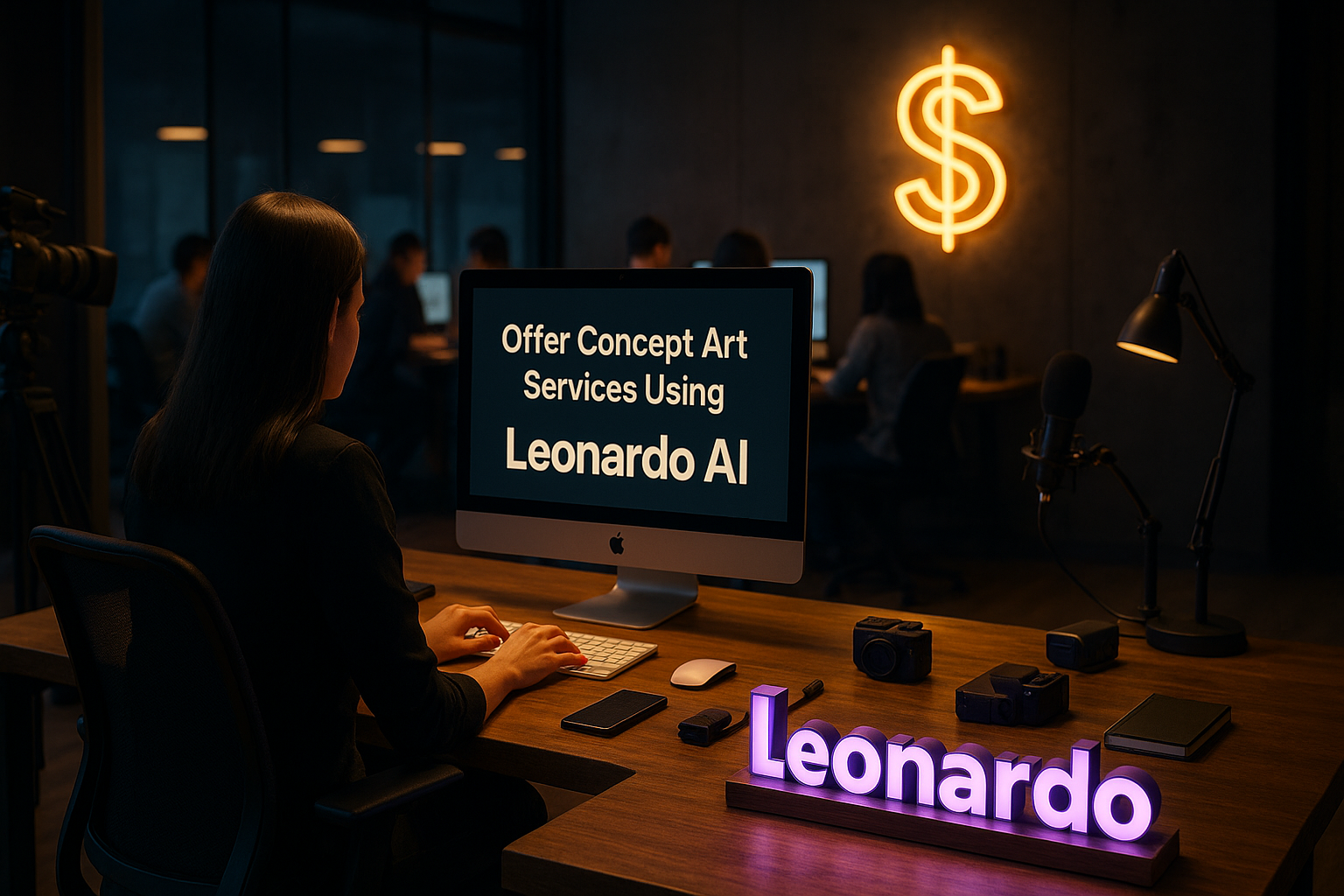
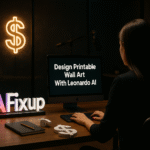
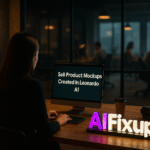




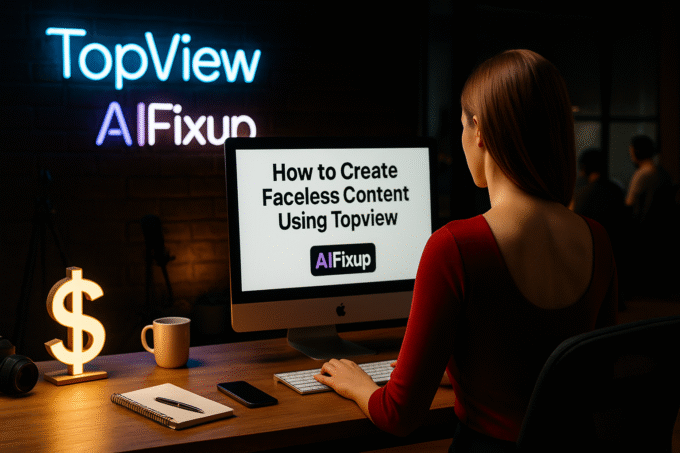

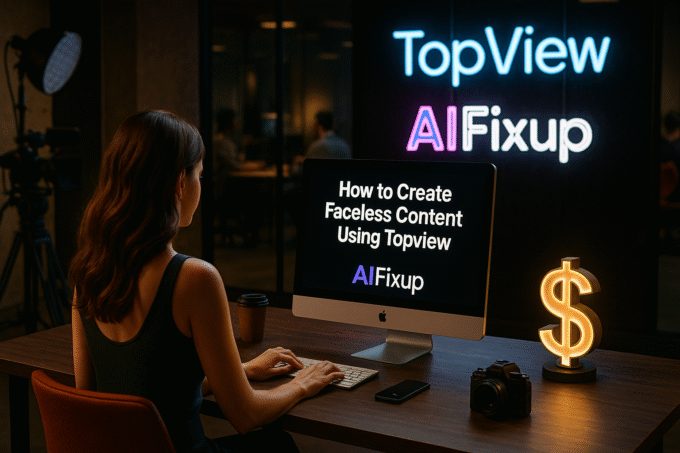

Leave a comment